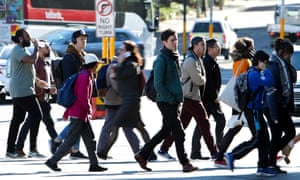Research finds 27.6% of people say they feel lonely at least three days every week
More than one-fifth of Australians rarely or never feel they have
someone to talk to or turn to for help, and more than one quarter feel
lonely for at least three days every week, according to a comprehensive
study of loneliness and wellbeing.
Swinburne University in Melbourne and the Australian Psychological Society are conducting the country’s first research project on the impact of loneliness on physical and mental health, and released their preliminary findings on Friday.
A nationally-representative sample of adults were asked to answer an online survey between 29 May and 1 October 2018. Loneliness was measured using the UCLA Loneliness Scale, considered the gold standard questionnaire to determine feelings of social isolation.
When directly asked how lonely they felt, 50.5% of Australians
reported they felt lonely for at least a day in the previous week; 27.6%
felt lonely for three or more days. Nearly 30% rarely or never felt
they were part of a group of friends.Swinburne University in Melbourne and the Australian Psychological Society are conducting the country’s first research project on the impact of loneliness on physical and mental health, and released their preliminary findings on Friday.
A nationally-representative sample of adults were asked to answer an online survey between 29 May and 1 October 2018. Loneliness was measured using the UCLA Loneliness Scale, considered the gold standard questionnaire to determine feelings of social isolation.
“One in four (25.5%) do not feel they have a lot in common with the people around them,” the Australian Loneliness Report found.
“One in five (21.4%) rarely or never feel close to people, rarely or never feel they have someone to talk to (22.1%) and don’t feel they have people they can turn to (21.4%).
“Nearly a quarter (24.5%) say they can’t find companionship when they want it.”
Anxiety about social interactions is also common. People reported that meeting people at parties, talking to unfamiliar people, and speaking with someone in authority provoked the most anxiety. Higher levels of loneliness are associated with higher levels of social interaction anxiety and psychological distress, less social interaction, and poorer quality of life.
Married Australians and those aged over 65 are the least lonely. No significant differences in loneliness was found between men and women, though men reported being less social.
“Australians over 65 years also report better physical and mental health, lower levels of social interaction anxiety, fewer depression symptoms and greater social interaction than younger Australians,” the study found.
Just 11% of people have a large friendship group they see at least once a month, while 8% don’t see any friends regularly. About one fifth never or seldom have a relative available to talk to.
The survey is still open for recruitment as part of a larger study run by Swinburne University. It is being led by Dr Michelle Lim, who said meaningful relationships protect physical and mental health.
“Quality is more important than quantity,” she said.
“More often than not, people are surrounded by friends. But if these friendships do not meet a person’s needs, such as feeling supported or connected, then they will still feel lonely even if they have many friends.”
Relationships with neighbours were also analysed. Data showed that a third of Australians do not see or hear from their neighbours on a monthly basis, and nearly half have no neighbours they can call for help.
Australian Psychological Society president, Ros Knight, said the findings demonstrate loneliness is a public health issue.
“We need to consider approaches to loneliness as part of our health and mental health strategy,” she said.
Loneliness is increasingly being recognised around the world as a significant health and social issue. In Britain - where more than 9 million people report often or always feeling lonely – a minister for loneliness was appointed in January. And in Australia, the Victorian upper house MP Fiona Patten described loneliness as an issue so severe it requires government intervention, proposing a minister for loneliness be appointed to reduce stigma and address growing social isolation.

No comments:
Post a Comment